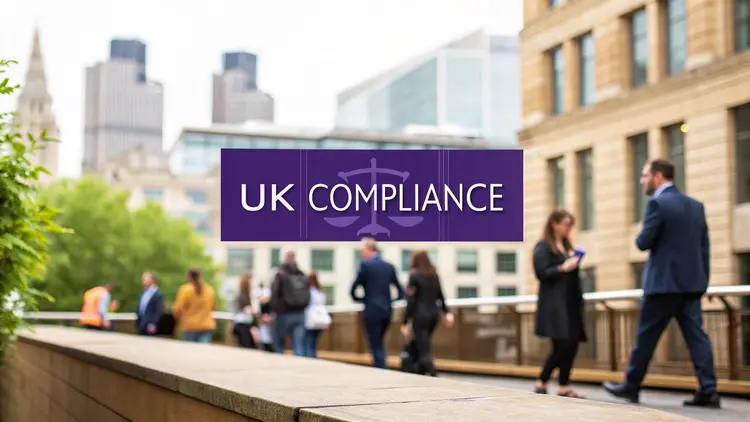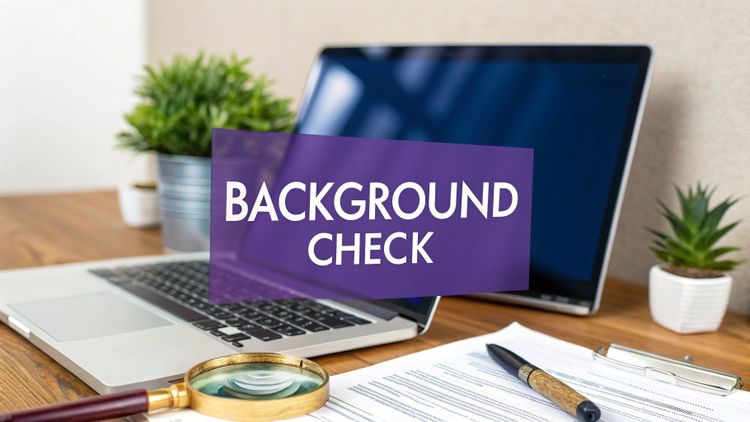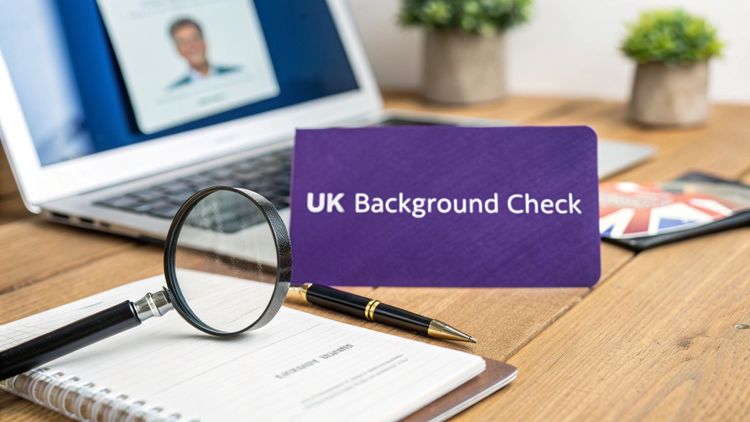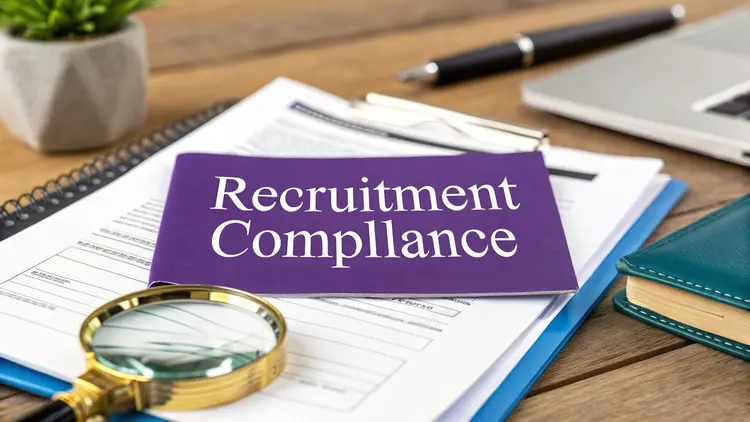SeeMeHired Insights
UK Background Check Compliance Guide

Comprehending the Background Check Compliance Landscape

Keeping abreast with background check regulations in the UK can be challenging. The regulatory environment is constantly evolving, making it crucial for any organisation hiring in the UK to understand and adhere to these rules. It requires more than just ticking boxes; it demands a comprehensive grasp of the legal framework and a dedication to ethical hiring. This necessitates that businesses remain informed and proactive.
One reason for the heightened emphasis on background checks is the increasing recognition of their significance in the vetting process. This trend mirrors the global nature of today's workforce and the related risks. A 2018 survey indicated that 78% of UK employers conducted background checks, a notable rise from 60% in 2016.
However, the same survey revealed that 40% of UK organisations do not perform background checks on international candidates. This gap underscores the challenges businesses encounter. They must balance strict compliance with the practicalities of a diverse workforce. For more details on these statistics, see: Survey Finds Growth in UK Organisations Performing Global Background Checks.
The following table illustrates the trends:
Background Check Adoption Rates in UK Organisations
This table displays the increase in background check adoption among UK employers and highlights the disparity between domestic and international candidate screening.
| Year | Overall Adoption Rate | International Candidate Screening Rate | Key Motivating Factors |
|---|---|---|---|
| 2016 | 60% | Data not available | Increased awareness of fraud and security risks |
| 2018 | 78% | 38% (estimated based on 40% neglecting checks) | Globalisation of the workforce, emphasis on compliance |
| 2020 | Estimated 85% | Estimated 50% | Changes in data privacy regulations, focus on safer workplaces |
| 2022 | Estimated 90% | Estimated 65% | Increased regulatory scrutiny, greater emphasis on due diligence |
As shown, while overall background check adoption is rising, a notable gap remains in the screening of international candidates. Organisations need to address this to ensure a consistent and compliant hiring process.
Key Compliance Areas to Consider
When dealing with background check compliance, several key areas require attention:
Data Protection (UK GDPR): The UK GDPR sets strict limits on how personal data is collected, used, and stored. Employers must have a legitimate reason for processing candidate information and ensure they only gather what is necessary.
Equality Act 2010: The Equality Act 2010 prohibits discrimination based on protected characteristics. Background checks must be fair and consistent for all candidates, ensuring no group faces unfair disadvantages during hiring.
Rehabilitation of Offenders Act: This Act allows certain criminal convictions to become “spent” after a set time, meaning employers generally can't consider them. Exceptions exist for roles involving vulnerable individuals, protecting those who have reformed and reintegrated into society.
Sector-Specific Regulations: Some industries, like finance and healthcare, have specific rules about background checks, reflecting the sensitive nature of the work and the need to protect vulnerable people.
Developing a Compliant Background Check Process
Creating a compliant process is an ongoing task. Regular reviews and updates are necessary to align with changing laws and best practices, ensuring long-term effectiveness and reducing potential risks.
Here’s a practical guide:
Establish Clear Policies: Document your policies, explaining the types of checks performed, their reasons, and how the information will be used. This transparency builds trust with candidates and ensures consistency.
Obtain Informed Consent: Always secure written consent from candidates before conducting background checks, showing respect for their privacy and ensuring legal compliance.
Use Reputable Providers: Partner with accredited screening providers who comply with data protection laws and industry best practices, ensuring accurate and reliable information.
Consistent Application: Apply background check policies uniformly for all candidates, avoiding discrimination claims.
Secure Data Handling: Implement strong data security measures to protect sensitive candidate information, including secure storage, access controls, and data encryption.
Following these guidelines allows organisations to build a background check process that is compliant and contributes to a fair and efficient hiring process. This approach improves the candidate experience while minimising potential risks.
Mastering UK Legal Requirements for Screening Success

Successfully navigating the UK's background check process requires a thorough understanding of the relevant legal framework. This ensures your screening practices are both thorough and compliant. This section explores the essential legal aspects for achieving screening success in the UK.
The Foundation: UK GDPR
The UK General Data Protection Regulation (UK GDPR) is central to background check compliance, governing how personal data is collected, processed, and stored. For example, the UK GDPR requires employers to have a lawful basis for processing candidate data.
This means every piece of information gathered must have a clear, justifiable purpose related to the specific role. The UK GDPR also mandates obtaining explicit consent from candidates before any background checks begin, fostering trust and ensuring legal compliance.
Data collected must be relevant to the role. For instance, credit checks are only acceptable if directly relevant to the job responsibilities. Background check compliance also hinges on restricting checks to information relevant to the role and obtaining explicit consent from candidates before conducting them. Credit checks are permissible only when directly tied to job duties.
Moreover, the law generally prohibits using 'spent convictions,' protecting rehabilitated individuals, except in specific roles involving vulnerable groups. Non-compliance can result in penalties, including fines up to £17.5 million. Failure to comply also risks legal action and reputational damage. Learn more about background checks and GDPR: What Employers Need to Know About Background Checks in the UK.
Beyond GDPR: Other Essential Legislation
Other crucial laws influence UK background checks beyond the UK GDPR. The Rehabilitation of Offenders Act (ROA) protects individuals with spent convictions. After a specific period, past offences are considered “spent” and shouldn't impact employment prospects, though exemptions exist for roles involving vulnerable groups.
The ROA requires a careful balance between safeguarding needs and rehabilitation rights. The Equality Act 2010 mandates fair and consistent treatment for all candidates, irrespective of protected characteristics. Your screening process must avoid discrimination based on age, gender, race, religion, or other protected attributes, ensuring equal opportunity and preventing legal challenges. For more information on employment law: How to Master UK Employment Law Compliance.
Sector-Specific Considerations
Specific sectors have additional compliance requirements for background checks. In financial services, checks are stricter due to industry sensitivities and the need to prevent fraud. The healthcare and education sectors also require enhanced checks, especially when roles involve direct contact with vulnerable people. Understanding these nuances is essential for meeting sector-specific legal demands.
Implementing a Robust Compliance Framework
A strong compliance framework requires thorough planning and ongoing vigilance. This builds trust with candidates and protects your organisation. A robust framework involves:
Clearly defined policies
Thorough documentation
Consistent application of procedures
Regular reviews and updates
By focusing on these areas, you can establish a background check process that is both legally sound and contributes to a safe, fair, and compliant workplace. This proactive approach protects both your organisation and the individuals screened.
To illustrate UK background check compliance, the following table provides a summary:
UK Background Check Compliance Requirements by Law
| Legislation | Key Requirements | Applicable Sectors | Potential Penalties for Non-Compliance |
|---|---|---|---|
| UK GDPR | Lawful basis for processing data, explicit consent, data relevance | All | Fines up to £17.5 million |
| Rehabilitation of Offenders Act (ROA) | Consideration of spent convictions, exemptions for roles with vulnerable groups | All | Varies depending on the nature of the violation |
| Equality Act 2010 | Fair and non-discriminatory screening practices | All | Legal action, reputational damage |
This table highlights the interconnected nature of UK employment law concerning background checks. While UK GDPR focuses on data protection, the ROA emphasises rehabilitation, and the Equality Act ensures fair treatment. Understanding these legal requirements is vital for creating a comprehensive and legally sound screening process.
The Right Check at the Right Time: A Compliance Blueprint

UK employers need to move beyond a one-size-fits-all approach to background checks. This involves creating screening strategies that are both effective and legally compliant. It's more than just ticking boxes; it's about understanding the nuances of each check and when it's appropriate.
Understanding the Spectrum of Background Checks
UK employers have access to a variety of verification methods, each serving a specific purpose. Standard DBS checks are often the starting point, revealing criminal records and barring information. The level of check (basic, standard, or enhanced) should be appropriate for the role.
For instance, a standard DBS check might be suitable for a role with financial responsibilities, while an enhanced DBS check is required for roles involving children or vulnerable adults.
Reference verifications provide insights into a candidate's past performance and work ethic. Credit checks may be relevant for some positions, particularly those involving financial handling. A credit check could be justified for a finance manager, but not for a retail worker. It's important to conduct financially related checks only when necessary.
Navigating Legal Permissibility and Potential Issues
Each check has its own legal boundaries. Social media screening, while gaining popularity, presents risks if not handled carefully. Employers must avoid discrimination and only consider publicly available information relevant to the role. Examining a candidate's religious beliefs on social media is inappropriate and potentially discriminatory. Reviewing public posts about professional conduct could be relevant.
Determining appropriate lookback periods is also key. While a longer lookback might seem preferable, it may not be legally allowed or relevant. Careful consideration of the role and its risks is crucial. The UK government has implemented legal measures since 2008 to strengthen background check compliance, particularly affecting lookback periods. Learn more: The Consequences of Neglecting Background Screening and Compliance in the UK.
Strategic Approaches for High-Risk Roles
Some roles require greater scrutiny. Positions involving access to sensitive information or vulnerable individuals demand a more comprehensive approach. This might include a combination of enhanced DBS checks, credit checks, and thorough reference verifications. You may also be interested in: The Significance of E-Recruitment in HR.
Balancing Thoroughness and Legal Adherence
Balancing thorough screening with respect for candidate rights is crucial. Compliance-focused organisations need a documented and consistent process. This includes clear consent, secure data handling, and transparent communication with candidates. This ensures checks are conducted lawfully and ethically, protecting both the organisation and the candidate.
By following these principles, UK employers can develop robust background check processes. These processes protect their business while upholding fair hiring practices. This involves understanding each check, adhering to legal rules, and tailoring the process to the role.
Establishing a Reliable Background Check Process

This article provides a practical, step-by-step guide to establishing a robust background check system. This system helps you meet background check compliance requirements and optimise your hiring process. We’ll share insights from experienced HR leaders who have successfully navigated these waters.
Defining Your Background Check Needs
The first step is determining which checks are necessary for each role. A one-size-fits-all approach is neither efficient nor compliant. Carefully consider the specific duties and potential risks associated with each position. A finance role might require a credit check, while a role involving children might necessitate a Disclosure and Barring Service (DBS) check.
Obtaining Consent and Maintaining Transparency
Before conducting any checks, obtain explicit written consent from the candidate. Clearly explain the purpose of the checks and how the information will be used. Transparency builds trust and is crucial for UK GDPR compliance. Providing candidates with a copy of their report reinforces this open approach and contributes to a positive candidate experience. Learn more about improving the candidate experience: How to Create an Outstanding Candidate Experience.
Developing a Consistent Evaluation Framework
Create clear criteria for assessing background check results. What constitutes a red flag? How will discrepancies or unfavourable information be addressed? A consistent framework promotes fairness and helps prevent discriminatory practices. This means using the same standards for all candidates. Define acceptable thresholds for financial history and criteria for assessing criminal records.
Integrating Background Checks Seamlessly into Your Workflow
Integrate background checks efficiently into your recruitment workflow. This minimises delays and keeps candidates engaged. Use technology to automate tasks like sending consent forms and receiving reports. This streamlined approach expedites the process without sacrificing compliance.
Handling Sensitive Information and Disputes
Protecting candidate data is paramount. Implement strong security measures, including secure storage and restricted access. Establish a clear protocol for addressing candidate disputes regarding background check information. Enable candidates to review and challenge inaccuracies. This demonstrates your commitment to fairness and data privacy.
Managing Third-Party Providers
If using third-party providers, ensure they meet the same compliance standards as your organisation. Evaluate their performance and data security practices regularly. Don’t outsource your compliance responsibilities entirely. Maintain active oversight to ensure providers adhere to industry best practices.
By following these steps, you can build a background check process that is both thorough and compliant. This approach protects your organisation and enhances the candidate experience. A robust process showcases your commitment to ethical hiring, creating a more inclusive and trustworthy workplace.
Global Talent, Local Compliance: International Screening
Hiring international talent brings a wealth of skills and perspectives to UK businesses. It enriches teams and fosters innovation. However, expanding your talent pool globally also adds complexity to background check compliance. Navigating international legal systems and data privacy regulations requires a strategic and informed approach.
Understanding The Challenges of International Screening
Screening international candidates presents unique hurdles. One significant challenge is the varying data protection laws across different countries. The UK GDPR sets a high standard for data privacy, but other countries may have different, and sometimes less stringent, rules. This can make it difficult to obtain necessary information while remaining compliant with both UK and international laws.
Additionally, accessing reliable information in certain countries can be problematic. This can be due to limited data availability or differing record-keeping practices. For example, verifying educational credentials from a university in a country with limited online records can be time-consuming. It can also require specialised expertise. This means UK employers need adaptable processes for verifying information from a wide range of sources.
Adapting Your Screening Process for International Candidates
To effectively screen international talent while maintaining compliance, UK employers must adjust their processes. This should include:
Understanding Local Laws: Research the data privacy and employment laws of the countries where your candidates reside. This knowledge is crucial for ensuring your screening practices comply with all applicable regulations.
Developing Flexible Verification Methods: Implement strategies that allow for different methods of verification. This might include working with international background check providers. It could also involve using alternative methods, such as character references or professional certifications, for verifying credentials.
Ensuring Consistent Standards: Maintaining consistent screening standards across your organisation is essential, even with international variations. This promotes fairness and helps avoid discrimination claims. Consistency involves applying similar criteria and timelines for all candidates, regardless of location.
Addressing Cultural Differences: Be mindful of cultural nuances that might impact the screening process. For instance, different countries have varying norms around disclosing personal information. Sensitivity to these differences helps ensure a respectful and compliant process.
Partnering with International Screening Providers
Many UK organisations utilise specialised international background check providers. These providers possess the expertise and resources to navigate the complexities of international regulations and data access challenges. When selecting a provider, consider:
Compliance Credentials: Ensure the provider complies with both UK GDPR and the relevant data protection laws of the countries where they operate. Request documentation of their compliance policies and procedures.
Global Reach: Evaluate their coverage and experience in the specific countries from which you hire. A provider with a strong global network offers more efficient and reliable service.
Data Security Measures: Confirm the provider employs robust data security measures to protect sensitive candidate information. These should include data encryption, secure storage, and regular security audits. SeeMeHired integrates seamlessly with compliant third-party providers. This allows you to manage all your screening needs within one secure platform. Learn more about SeeMeHired’s compliance features: SeeMeHired Compliance.
Building a Compliant and Effective International Screening Programme
By adapting their existing processes and partnering with reputable providers, UK businesses can develop robust international screening programmes. These programmes should:
Be legally compliant with UK and international laws
Ensure consistent screening standards
Protect candidate data privacy
Provide a positive candidate experience
Investing in a well-designed international screening programme helps UK employers attract and hire top global talent while minimising risks. It demonstrates a commitment to compliance, fairness, and building a diverse and inclusive workforce. A streamlined process also facilitates onboarding, enabling international hires to quickly become productive team members.
Avoiding the Compliance Pitfalls That Harm Employers
Background check compliance is more than just meeting requirements; it's about establishing a robust, ethical, and legally sound hiring process. Failing to do so can lead to serious consequences for UK employers. This section examines real-world compliance failures and offers proactive strategies to avoid them.
Common Compliance Oversights
Many organisations stumble over common compliance oversights. One frequent mistake is the improper handling of sensitive data. This could involve insufficient data security, potentially causing breaches, or neglecting to secure proper consent before conducting checks. Another frequent issue is the inconsistent application of screening criteria. Using different standards for different candidate groups creates a risk of discrimination claims. For instance, demanding enhanced DBS checks for some ethnic groups while performing basic checks for others is discriminatory and illegal.
Furthermore, some employers fail to recognise the value of regular audits. These audits are crucial for uncovering weaknesses in the screening process before they escalate into significant problems. Without regular checks, outdated procedures or non-compliant practices may persist, increasing risk. Finally, inadequate staff training can contribute to compliance breaches. All staff participating in the hiring process must have comprehensive training on data protection laws, consent procedures, and anti-discrimination legislation. This training should be regularly updated to accommodate changing regulations.
Proactive Strategies for Strengthening Compliance
Establishing strong compliance requires proactive measures. This involves:
Regular Audits: Periodically review your background check process. This will identify improvement areas and ensure compliance with evolving legal standards. Think of it as a health check for your hiring process.
Effective Staff Training: Provide thorough training to all staff members involved in hiring. This should cover data protection, consent procedures, the Rehabilitation of Offenders Act, and equality legislation. Regular refresher courses will keep this knowledge up-to-date and reinforce best practices.
Clear Escalation Procedures: Create clear protocols for handling sensitive cases or adverse information. This will ensure consistent and equitable treatment of all candidates, offering a defined process for issue resolution.
Building a Culture of Compliance: Cultivate a workplace where compliance is valued and integrated into every stage of hiring. This includes fostering open communication, providing staff resources, and encouraging questions. See our guide on providing candidate feedback for additional best practices.
Recognising Early Warning Signs
Identifying potential compliance problems early can prevent them from becoming serious. Some warning signs to look out for include:
Lack of Documented Policies: Without clear documentation, it's difficult to ensure consistent implementation and demonstrate compliance in your background check process.
Inconsistent Procedures: If different hiring managers use varying screening methods or criteria, it can lead to unfairness and legal difficulties.
Candidate Complaints: Any complaint about the screening process, particularly those concerning data privacy or perceived discrimination, needs prompt investigation.
High Staff Turnover in HR: Frequent changes in HR personnel could suggest issues within the hiring process, including potential compliance problems.
Balancing Security and Ethics
Background check compliance extends beyond simply following the rules; it involves balancing security needs with ethical practices. This means treating candidates with fairness and respect throughout the process. It also requires transparency about the information collected, why it’s needed, and how it’s used. By incorporating ethical principles into your background check procedures, you build trust with candidates and cultivate a positive hiring experience. This approach enhances your organisation's reputation and contributes to a more inclusive and ethical workplace. By proactively addressing these considerations, organisations can avoid costly errors and develop a background check system that is both compliant and advantageous. This ultimately creates a safer and more equitable environment for everyone.
Preparing Your Background Check Compliance for the Future
The regulatory landscape surrounding background checks is constantly evolving. Forward-thinking UK employers need to anticipate changes and adapt their screening processes proactively. This means not just meeting current regulations, but building a system that can handle future developments. This section explores emerging trends and provides practical strategies for staying ahead of the curve in background check compliance.
Emerging Trends Shaping Compliance
Several key trends are shaping the future of background checks. AI-powered verification tools, such as those offered by Checkr, are becoming increasingly advanced, offering faster and more efficient ways to verify information. However, the use of AI in hiring raises ethical considerations regarding bias and fairness, requiring careful oversight and transparency.
Blockchain credentials offer a potentially secure and tamper-proof method for storing and verifying qualifications. While still in the early stages of adoption, blockchain could transform how we handle credentials, particularly for international candidates.
Continuous monitoring systems are gaining traction. These systems provide ongoing updates on employee records, allowing for real-time monitoring of criminal activity or other relevant changes. This offers a proactive approach to risk management, going beyond pre-employment checks. However, implementing continuous monitoring requires careful consideration of data privacy and employee rights.
Adapting to Workplace Changes
Modern workplace changes, such as the rise of remote work and the gig economy, present new challenges for background check compliance. Remote employment makes traditional verification methods more complex, requiring new approaches to identity verification and document management.
The growth of the gig economy introduces questions around how to classify and screen temporary or contract workers. Borderless hiring adds another layer of complexity, demanding compliance with multiple international data privacy regulations and local legal frameworks.
Practical Strategies for Future-Proofing
To future-proof your background check process, consider these practical strategies:
Embrace Technology: Evaluate and adopt new technologies strategically. Don't just chase the latest trends; carefully consider how technologies like AI or blockchain can genuinely enhance your process while maintaining ethical and legal standards.
Anticipate Regulatory Shifts: Stay informed about emerging legislation and best practices. This proactive approach allows you to adapt to changes smoothly, avoiding last-minute scrambles and potential non-compliance issues.
Build Adaptive Systems: Design your background check process to be flexible and adaptable to future changes. This might involve modular design or integrating with platforms that can easily accommodate new technologies and regulations. Learn more in our article about the importance of candidate feedback.
Prioritise Data Privacy: As data privacy regulations become increasingly stringent, prioritise security and transparency in your data handling practices. This builds trust with candidates and minimises risks associated with data breaches or misuse.
Invest in Training: Provide ongoing training to your HR team on evolving regulations and best practices. This ensures they have the knowledge and skills to navigate the ever-changing landscape of background check compliance.
By implementing these strategies, you can create a background check system that's not only compliant today but also prepared for tomorrow's challenges. This forward-thinking approach protects your organisation, enhances your hiring process, and strengthens your position in the evolving world of talent acquisition.
Enhance your hiring process and maintain compliance with SeeMeHired, the comprehensive applicant tracking system crafted for expanding businesses. SeeMeHired directly integrates with background checks, keeping everything on one platform. Learn more about SeeMeHired and request a demo today!



























